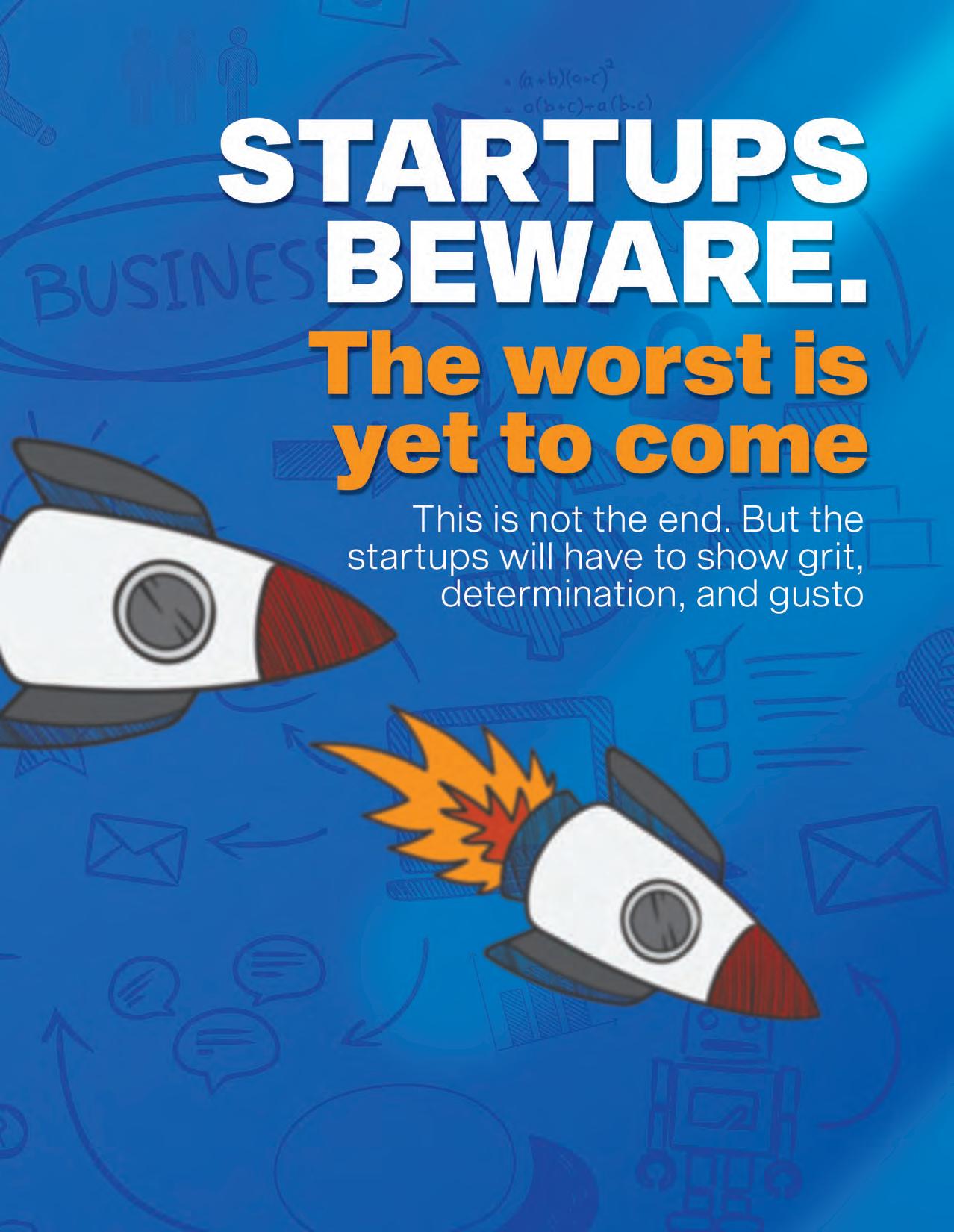
15 minute read
Startups beware. The worst is yet to come

If the news of quick commerce startup Airlift cutting down operations and laying off staff rattled you, know that the worst is yet to come. The proverbial party is on hold for now, and while it may have been a blast while it lasted there are now splitting headaches to nurse and consequences to deal with. The dizzying highs seen by tech-startups all over the world have been brought down to abysmal lows by the brutal claws of a market that is persistently bearish in the face of rising inflation and a global recession. Major tech players including Apple, Microsoft, Amazon, and Google have taken significant stock hits, shaking investor confidence and almost overnight making funding for startups scarcer than it has been in years. What does it mean for Pakistan? Very briefly put, it means for the time being funding is going to dry up and our startups will have to show their true metal. Over the past couple of years the startups have done very well for themselves. To list a few of their achievements, the startup ecosystem in Pakistan has managed to raise record amounts of funding, get massive valuations, capture the imaginations of the nation, and perhaps most importantly curate a workforce composed of young, driven, and talented individuals. These were the ‘dizzying’ highs we earlier mentioned from which they have been brought back to hurt. And all of these highs were largely achieved through a cash-burning strategy which involves spending exorbitant amounts of money for customer acquisition and unbridled growth. Little thought has been given to sustainability or the possibility of hard times - which we are now squarely in. The reality is that despite the hype Pakistan is very low down on the priority list of foreign investors, particularly Americans. Startups, essnetially, are babies. They need constant feedings, constant investment, constant attention, and it takes a lot of money to invest in them. If you’re lucky, they end up making something of themselves but if you aren’t then you’re stuck with a deadbeat leech. The problem for Pakistani startups is that for American investors they are not their babies. In fact, to American VCs Pakistani investors are the equivalent of the kittens that you discover outside your home one day and decide to leave them bowls of milk and shreds of chicken. You care about the kittens, you want them to grow big and strong so that maybe one day they’ll get rid of the mice infesting your lawn. But as soon as you lose your job, buying chicken and milk for the cats outside is no longer important - you have your own kids indoors that you need to worry about. The problem? You’ve spoiled the kittens so much they may no longer know how to fend for themselves.
Advertisement
It has largely been American VCs that have poured money into Pakistan and have spoiled the startups in the process. Now that their domestic market is facing a serious downturn, they will either focus on ‘safe investments’ or pour their money towards their own homegrown flagship startups.
That leaves Pakistani startups to fend for themselves. There are two ways to deal with this. The first is to cut costs and try to get by on the funding that they already have in the bank until the global recession ends and VCs are ready to back them again. This we are already seeing in the massive layoffs and downsizing. The key, however, will be finding internal cash sources. Startups that can cut costs and find streams of revenue to break even or be slightly profitable will be able to stave off the inevitable longer as well as impress VCs - which might be interested in investing looking at their grit.
The question is, will our startups manage to weather the storm or are they too used to their cash-burning growth models to toe a line of austerity? So — Are Pakistani startups preparing for a legendary rearguard effort, or are we already seeing the last throes of a sinking ship? That is the question.
Salman Allana

The global context
Here’s something right off the bat - Airlift probably didn’t have any other option but to lay-off 31% of their workforce. With funding flow gone almost overnight, startups all over the world have had to take firefighting measures to stay afloat and survive these direstraits. A lot can be said about how Airlift and others should have been prepared for this a long time ago. That is true, but it is also true that they are now doing the best they can to get through this.
And they are not alone. Globally, May was a brutal month with tens-of-thousands in the tech industry being laid off. In Pakistan, Airlift is the prime example of scaling down but not the only one. Two agritech startups, Tazah Tech and Jiye Tech had already changed plans for their business and downscaled staff, anticipating that it is going to get ugly in the near future. And all of it can be traced back to the bearish markets.
Between May 4 to May 7, the biggest tech stocks lost nearly $1.3 trillion in value in just three days. Apple lost $226 billion, Microsoft $190 billion, Amazon $174 billion, Google’s parent company Alphabet lost $125 billion value and Airbnb saw $24 billion of its value slashed. Trillions of dollars worth of companies have been wiped out in a matter of days.
On May 20, the S&P500 index fell 20%. When prices of publicly listed securities continue to fall, and if they fall 20% or higher, the bear market sets in - the investors are panicked and act as risk-averse than risk seeking.
“Every bear market has its own cause behind it. When March 2020 started, the US Fed put an emergency to support the repo markets with virtually unlimited capital,” explains Faisal Aftab, Co-Founder & Managing Partner at Zayn Capital. “When the pandemic hit, everything went down quickly.”
“When the lockdowns started in March 2022, the US Fed printed $7 trillion dollars and pumped it into the economy. That resulted in a massive short term artificial boom that started and peaked out in the October of 2021; the VC boom, the crypto boom, the housing market boom. Now, when you print so much money with a delayed 6 month effect, it creates inflation of all assets.”
The consequence has been that because the inflation has also peaked , the US Fed has resorted to increasing interest rates to curb inflation. “Once they started raising interest rates, the market started getting jittery,” says Faisal.
The increase in interest rates squeezes supply of money and increases borrowing cost for businesses, which pass it on to consumers. Consumers are faced with increasing credit

card or mortgage rates, or both and have less disposable income to spend which decreases the overall purchasing in the economy. Revenue for businesses declines because of a lower purchasing power while debt increases because of a higher borrowing rate. Because the business would now make less money, the stock prices fall. Investors also anticipate that the return on this stock is less and falling stock prices trigger panic selling which further decreases the stock price.
If many companies see a decline because of this phenomenon, the market as a whole experiences a downward spiral, setting in the bear market. Investors suffer exorbitant losses because of the fall in stock prices. Investing in securities becomes risky for investors and they start moving money towards safer investments. Venture capital investment is the riskiest of all investments, hence the funding crunch for startups all over the world. If stable companies like Apple and Alphabet could have concerns around their future profits because of high interest rates, they would not want to put money in highly risky, unstable startup companies that have prioritised growth at all costs instead of having strong fundamentals.
Why Pakistan is acutely affected
Pakistan, as mentioned before, will face the brunt of this downturn on the startup front. Over 90% of the funding that fueled the startup boom in Pakistan last year came from foreign investors — most of them American. Since investors in the states are seriously strapped for cash, Pakistan will be the last thing on their minds right now. And if they do think of their Pakistani investments, it will be how to get out of them.
The bear market phenomenon right now is a global one, and it is during times like these that everyone is looking out for themselves. Bear in mind (all puns intended) that both large and small foreign investors that have invested in Pakistan, do not have dedicated funds for Pakistan. They have invested from probably a very small allocation for Pakistan to test waters here. So amid this downturn, their focus would not be a frontier market like Pakistan. Bear also in mind that VC investors have invested heavily in startups around the world. The core investments of these funds are currently also in distress and they would rather divert funds towards these companies to support them instead of investing in new companies.
In short - scaling down is very much on the cards for Pakistani startups. Outside funding has been diverted to greener and safer pastures, and the local funds are not big enough to sustain the ecosystem without the riches of foreign funding. While there will be scrambling to get to the local funds, since there just isn’t enough to go around, startups here are very much anticipating a major cash crunch.
Several startups are facing the heat when it comes to raising funding. Cheetay, for instance, has reportedly not been able to raise a $10 million bridge round. Logistics startup Bykea has been unable to raise a $50 million funding round and is instead trying to raise a $10 million bridge round.
The problems with regards to fundraising are occurring because startups have prioritised growth despite weak fundamentals. Now as investors are cautious about risky investments, they are asking for strong fundamentals and a path to profitability, and cutting down on valuation multiples because of the same reasons.

The irony of it all
For those uninitiated in the world of startups and how they work, in very simple terms all startups begin by raising funds in different rounds. Initially the founder of the startup controls 100% equity and then sells off that equity in exchange for funding. Startup valuation is the process of quantifying the worth of a company, aka its valuation. During the seed funding round, an investor pours in funds in a startup in exchange for a part of the equity in the company. The higher the valuation that a startup gets, the more expensive its shares get. Because of this, it is very easy for startup founders to get distracted by high valuations. The higher the valuation, the more they can sell their equity for. The past few years have seen the startup bubble rise on the back of a record-long bull run that has given us some truly meteoric valuations. In a bull market there is euphoria and investors are in the fear of missing out (FOMO) and writing cheques at exorbitant valuations to get an allocation. Investors are looking to throw money anywhere they can and thus end up encouraging unstable companies with weak business fundamentals. It has been one large party in which investors bring in money and pay startup founders to spend the money with the belief that the startup will keep raising higher rounds even if it takes time to become profitable. In short - a bubble. Now, with the markets down, investors do not have the same luxury of throwing darts
Abrar Bajwa, the co-founder and CEO of Tazah

at a board whilst blindfolded. That is why they are now looking at the fundamentals of startups and trying to weed out the ones whose long-term business strategies make sense.
Ironically, it was thes very investors that were behind the great startup funding pump that had been exalting expensive growth strategies and agreeing to crazy valuations that are now asking sober, practical questions. With their money on the line, the investors have sobered up very quickly and the startups are now scrambling to catch up with the current reality.
These investors have encouraged the rise of unstable companies but are now discouraging investors from growing and encouraging them to at least stay alive. “Unit economics, healthy margins and discipline will be valued over GMV, booming revenue and unbridled growth,” an excerpt from the advisory from VC firm Shorooq Partners reads.
Founders too have been caught by surprise because of the urgency to shift focus in business and the nervousness because of uncertainty around funding. Most of the startup founders, even Pakistanis, are young, and have not lived through a recession like this before. And for the first time young founders, the situation is like a “deer caught in headlights”, as one investor put it.
In search of profitability
It is because of the funding crunch and the desire of investors to see strong fundamentals that startups in Pakistan, too, are trying to improve their profitability to decrease reliance on external capital. Airlift also announced that it was seeking profitability. Its scale down is in line with the need to cut expenses to have enough cash to sustain operations while fundraising is difficult. Though Airlift has credibility issues as reported by Profit earlier, because of which it is reportedly not been able to raise funds since last year before the bear market set in, despite making public announcements that they had received funding.
Airlift has since been under exhaustive due diligence from investors.
On the other hand, Tazah Technologies has also laid off over 100 people from its staff and pivoted towards a different business model, the details of which they shared with Profit but did not yet want them to be public. “We feel that the capital constraint has been really helpful in shaping our thinking towards building a valuable business that is capital efficient. Fortunately, due to our overcapitalization we have a runway of more than 3 years and are well placed to dominate in this new world,” says Abrar Bajwa, the co-founder and CEO of Tazah.
Jiye Technologies too has shifted focus towards farmers in the agri supply chain to cater to their needs, scaling down operations on the retailer side. The scale down has come with some staff members laid off but Ali Amin, co-founder of Jiye Technologies, says that because of the new focus, not many people were needed for operations concerning fruits and vegetables retailers. And that because of the prime focus on farmers, to scale operations on that front, they would be hiring new people, in line with the new reality of the business.
Hence the advisory from the YC, Shorooq Partners and local investors here has been that the startups should extend their runways which essentially calls for cost-cutting, manifested in the recent announcements of scaling down, layoffs and pivots.
Funnily enough, as the news of Airlift layoffs saddened the ecosystem, LinkedIn and Twitter posts have been abound by startup founders and ecosystem stakeholders in support of employees laid off by startups such as Airlift, offering to hire them in these hard times. This support appears superficial because of the dire times that require all startups to be focusing on increasing their runways which might entail layoffs at their own startups.
Startup founders have told Profit that their prime concern at this time was to stay alive and hiring resources at this time looked difficult. The times are going to get tougher ahead as the US Fed are poised to increase interest rates even further which would further squeeze the money available for investment.
The advisory for startups posted by YCombinator last week hence asked them to “prepare for the worst ‘’ and have a runway of 24 months. Salman Allana, the CEO of eCommerce logistics startup Rider, which was part of YCombinator’s Winter 2022 batch, says that the YC advisory actually implies that founders should actually build solid businesses, which has been their advisory even in good times.
“Don’t overreact, focus on unit economics are advice that are given to us in the good times as well as the bad times,” says Salman Allana. “The recent advisory reinforces that. If you were following this in good times, the bad times would not have such a big impact on you. You might have to steer the ship a few degrees here and there but you wouldn’t have to do a complete turn towards a different direction,” he says.
Conclusion
There isn’t much to it. The funding is drying up but only for now. Whether it lasts a year, or two years, or more than that this recession will end. When it does, a lot of people and startups will have been weeded out. The ones that are left behind will be hardened and better off for the experience.
At this juncture, the most important thing for our startups will be that they not just cut on costs and act austerely, as Airlift and others have already done, but also focus on their business fundamentals. This requires going back to basic unit economics and figuring out the question of profitability. After all, their success is good for Pakistan. Profit has often held startups here accountable. It has majorly been to warn against situations like this. Fundamentals are important, and we want Pakistani startups to thrive and be a catalyst for the economy. If they manage to get through this time, they will come out more established than ever before. n











